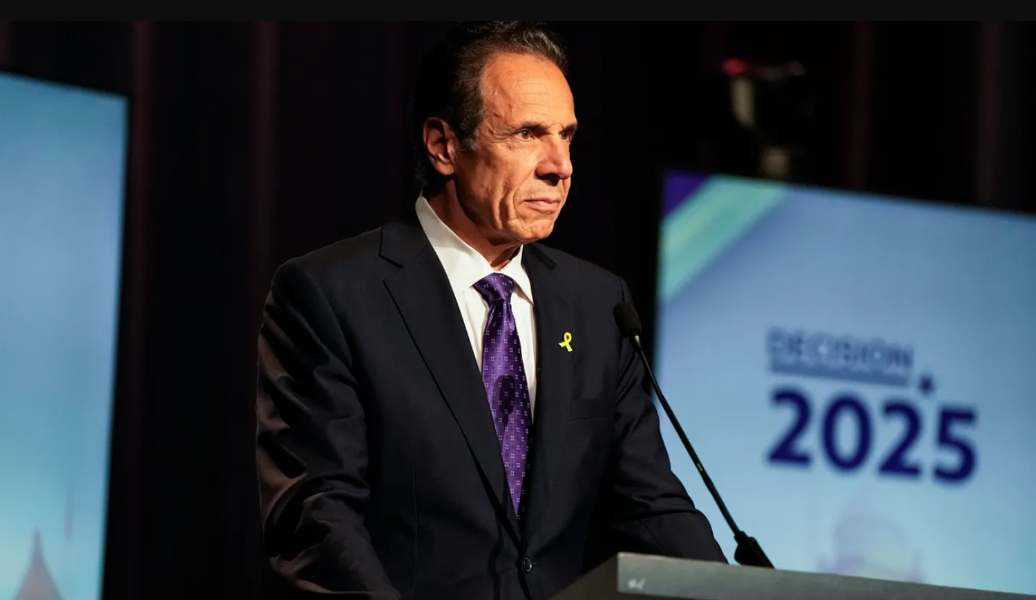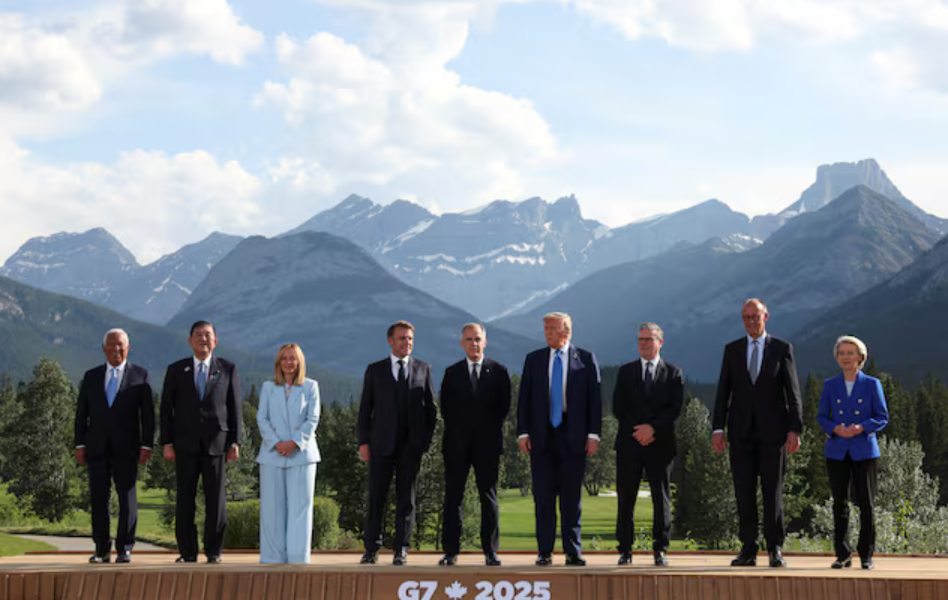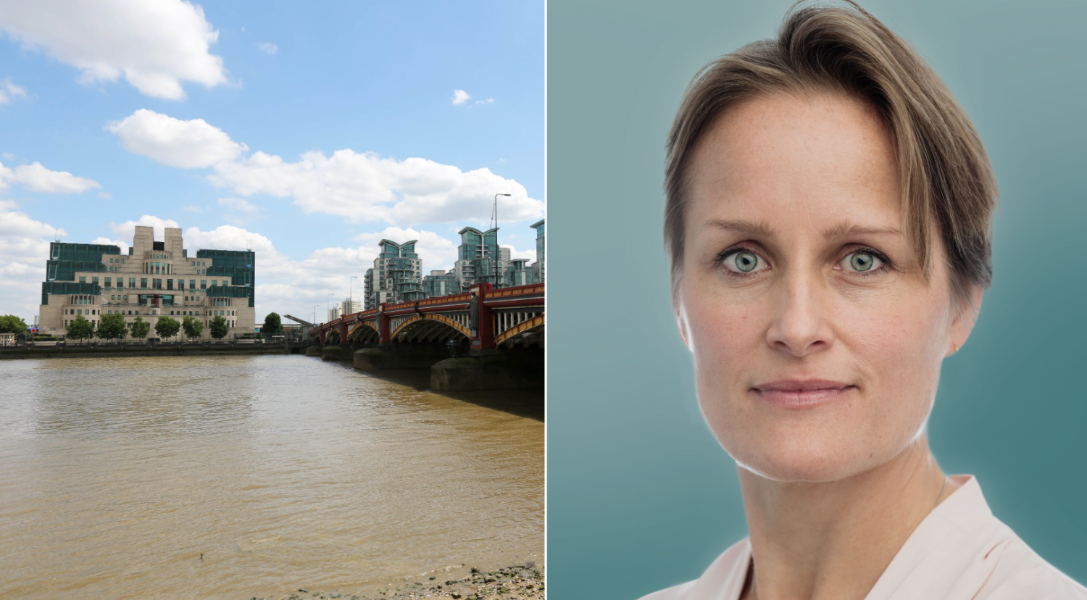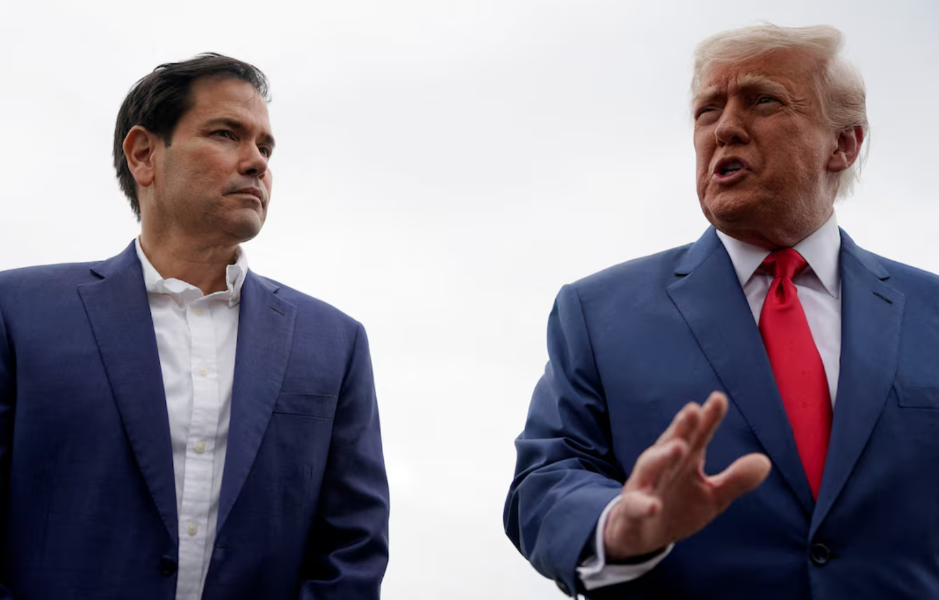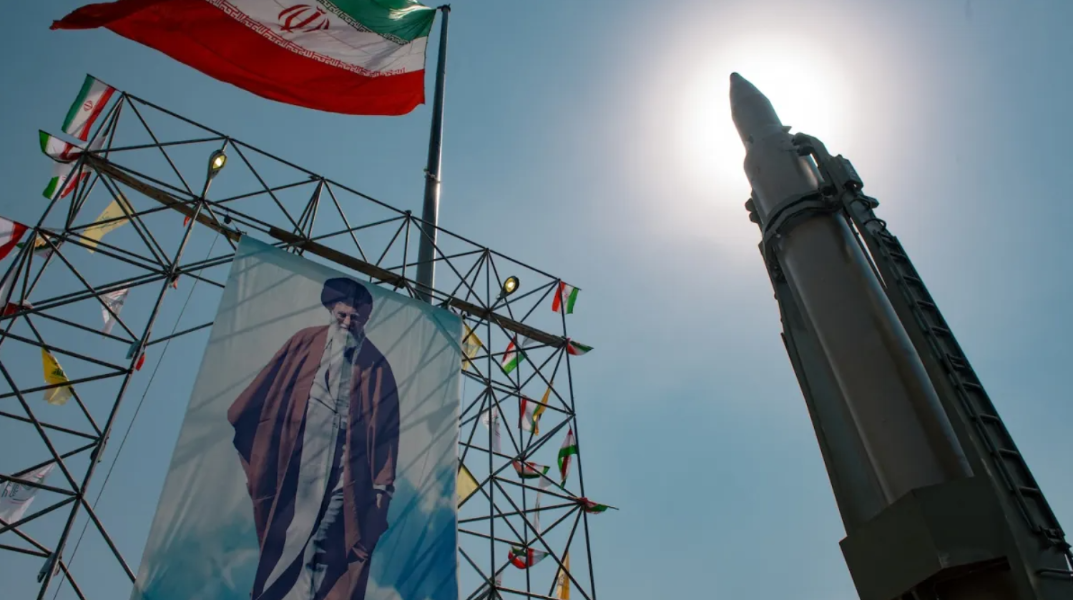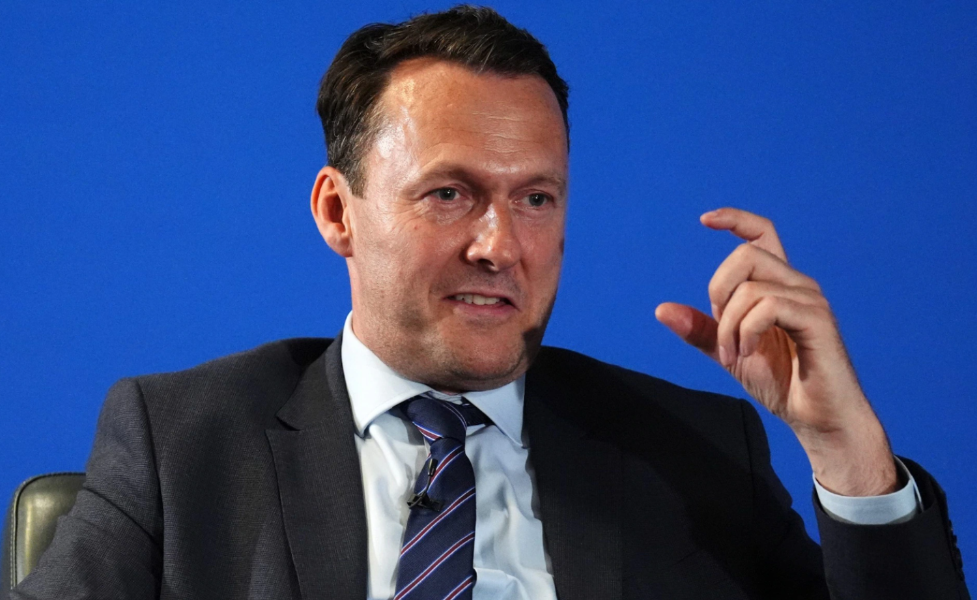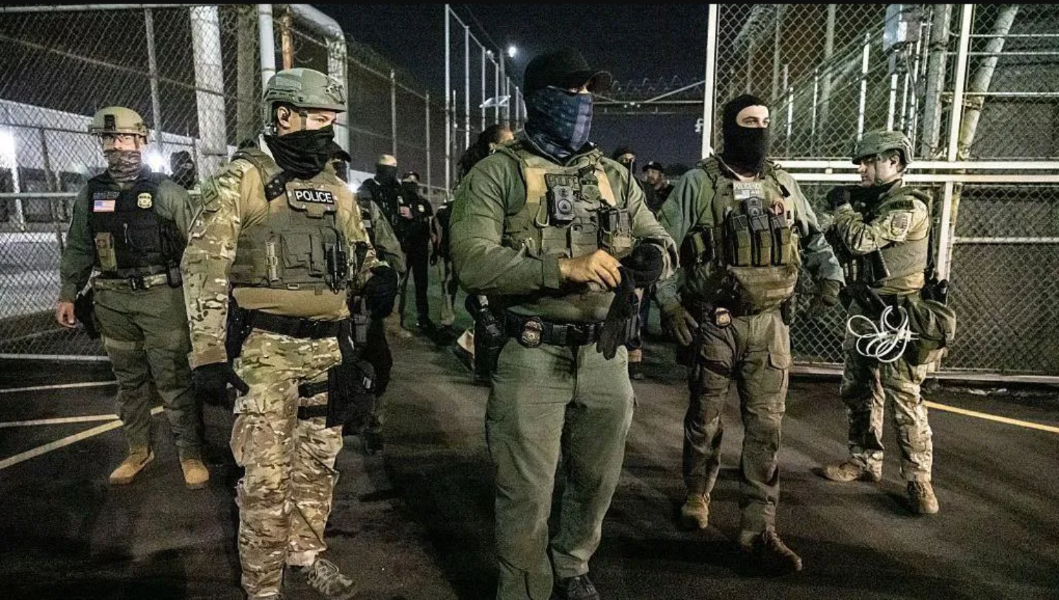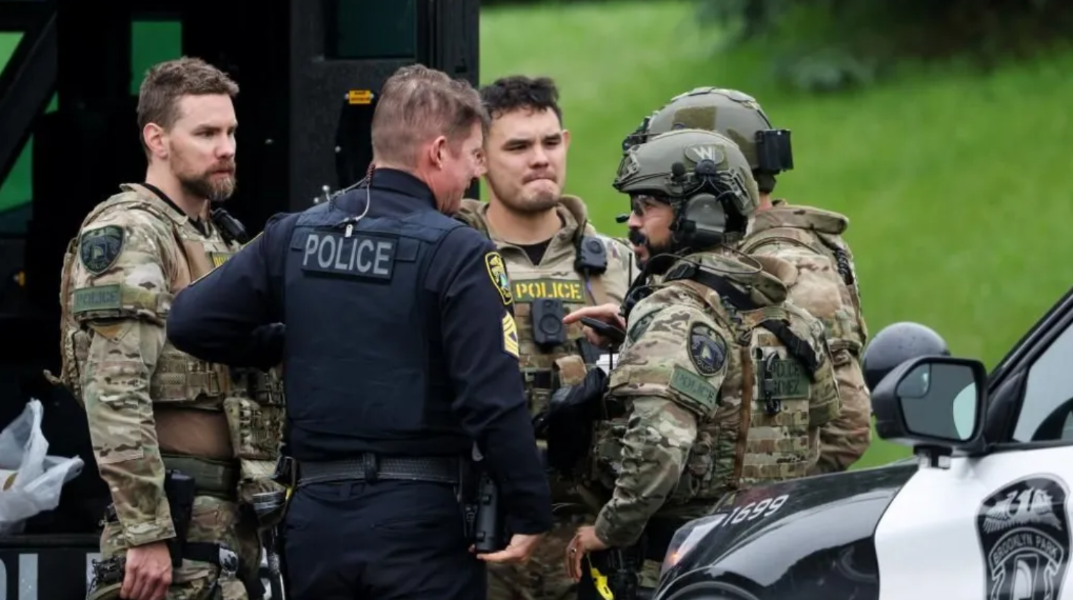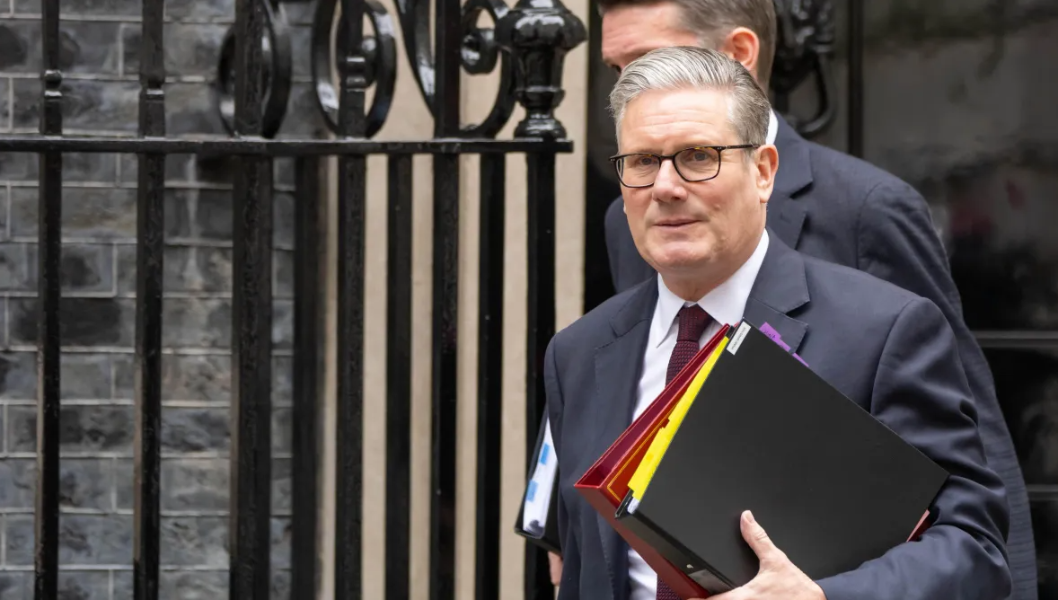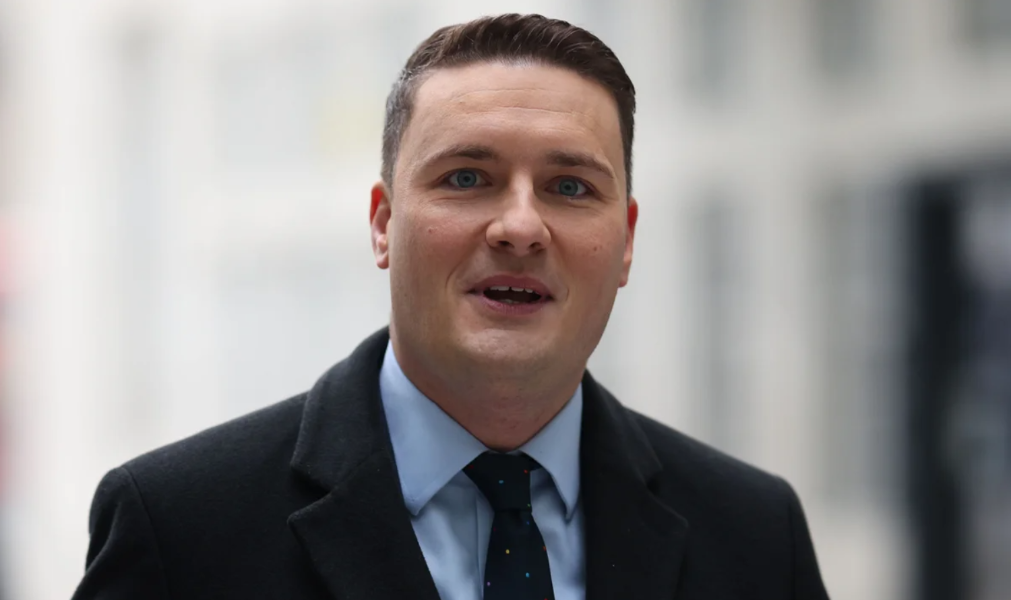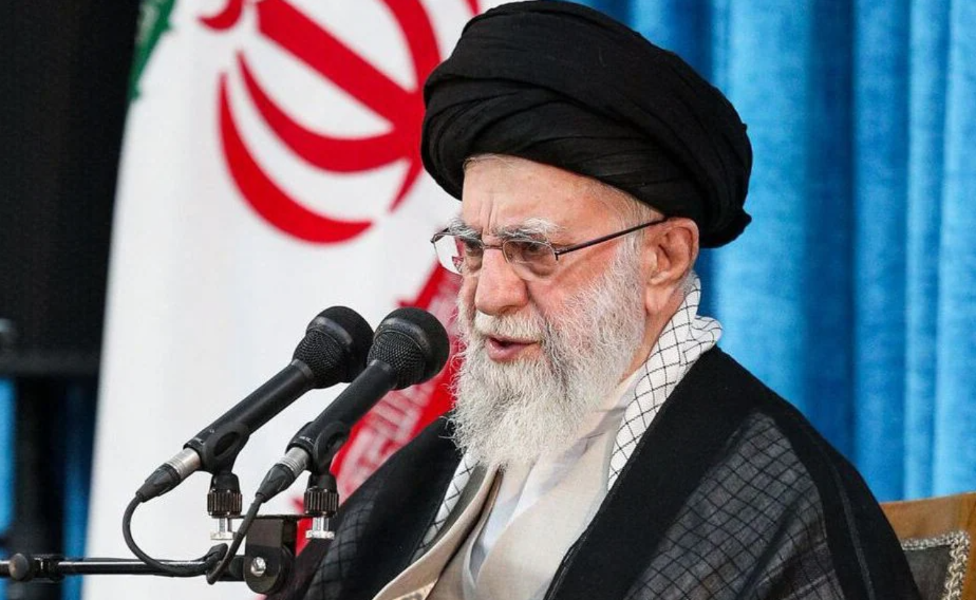-
Posts
10,706 -
Joined
-
Last visited
Content Type
Events
Forums
Downloads
Quizzes
Gallery
Blogs
Everything posted by Social Media
-
New York Mayor’s Race Becomes High-Stakes Battle for Democratic Identity The upcoming New York City mayoral election is shaping up to be more than just a local contest—it’s becoming a full-blown proxy war over the future of the Democratic Party. While Democrats continue to fret over losing blue-collar voters in states like Ohio and Pennsylvania, they may be ignoring trouble brewing in their urban heartlands. In cities they already govern, internal divisions are threatening to implode the party from within. New York, America’s largest city, is at the center of this drama. As Democrats pour time and resources into abstract policy ideas and messaging strategies aimed at reclaiming the heartland, they risk neglecting power bases they already control. “Such efforts give the sensation of activity and purpose without actually having to do anything,” a pointed critique of Democratic inertia notes. “It’s like the profoundly pointless Republican autopsy of 2013,” one observer remarked, “good for explaining what happened before, but famously bad at predicting what happens next.” While strategists craft theories, real political battles are being fought in places like Los Angeles, where Mayor Karen Bass faces increasing public dissatisfaction, or Chicago, where Mayor Brandon Johnson’s approval ratings have cratered. Johnson, elected on a promise of “bold progressive movement,” seems to have misjudged the direction—“boldly downward,” critics now quip. But no city matters more to the national narrative than New York. Despite its population decline, the city continues to lead discussions within the Democratic Party. And with the mayoral primary just a week away, the stakes couldn’t be higher. The winner of the Democratic primary will almost certainly become the next mayor, making this a defining moment for the party. Incumbent Mayor Eric Adams, who left the Democratic Party to run as an Independent after President Trump helped him avoid public corruption charges, is still in the mix, although his association with Trump—who only earned 30 percent of the city’s vote in 2024—may hurt more than help. Nevertheless, Adams remains a potential spoiler, especially in a chaotic field. The city’s ranked-choice voting system further complicates matters. With 11 candidates in the Democratic race, an outright majority is unlikely in the first round. Under this system, voters rank five candidates in order of preference. If no one gets a majority, the last-place candidate is eliminated and votes are redistributed based on subsequent choices until someone clears the 50 percent mark. Leading the Democratic field is former Governor Andrew Cuomo, who is attempting a comeback after resigning in 2021 amid sexual harassment allegations. Progressives had long viewed Cuomo as too moderate, and his return bid has sparked intense backlash from the party’s left wing. Choosing New York City for his political resurrection pits Cuomo against one of the most energized progressive communities in the country. His main rival is State Assembly member Zohran Mamdani, who is backed by a broad progressive coalition that includes former Mayor Bill de Blasio and Representative Alexandria Ocasio-Cortez. “Stopping Cuomo is essential to progressives’ national ambitions for the party,” Ocasio-Cortez has said. Mamdani’s platform includes rent control, city-run grocery stores, and reducing police powers—ideas that stir left-wing excitement and mainstream anxiety in equal measure. The New York Times editorial board has come out strongly against Mamdani, urging voters to back anyone but the 33-year-old legislator. Their concern is that a Mamdani victory could open the door for Adams to win reelection, or push New York down the same troubled path Chicago is currently navigating. Cuomo, at 67, is hardly the fresh face many Democrats hope for in a post-#MeToo era, but New York politics rarely deals in uncomplicated options. When former Mayor Michael Bloomberg endorsed Cuomo—despite their rocky history—it underscored the seriousness of this contest. The mayoral primary is shaping up as a decisive clash between progressive populists and establishment Democrats. Whatever the outcome, this race is likely to speak volumes about the direction of the Democratic Party in the years ahead—far more than any consultant-driven strategy memo or post-election panel ever could. Adapted by ASEAN Now from The Hill 2025-06-18
-
Clean up with the worst offending posts removed. This is nothing but a bash Israel topic littered with unsubstantiated claims and off topic rants. //closed// 5. You will not use ASEAN NOW to post any material which is knowingly or can be reasonably construed as false, inaccurate, invasive of a person's privacy, or otherwise in violation of any law. Topics or posts deemed to be scaremongering, deliberately misleading or which deliberately distort information will be removed. In factual areas such as news forums and current affairs topics member content that is claimed or portrayed as a fact should be supported by a link to a relevant reputable source. 15. You will not discriminate or post slurs, degrading or overly negative comments on the basis of race, gender, age, religion, ethnicity, nationality, disability, medical history, marriage, civil partnership, pregnancy, maternity, paternity, gender identity, sexual orientation or any other irrelevant factor.
-

Trump gets brutally shut down by Carney at G7
Social Media replied to spidermike007's topic in Political Soapbox
A series of off topic bickering posts and replies have been removed. Please discuss the topic. -

Trump Leaves G7 to Handle Middle East, Orders Evac
Social Media replied to Yagoda's topic in Political Soapbox
@johng an inflammatory and false troll post removed, one of a few today. -
G7 Backs Israel, Condemns Iran Amid Rising Tensions in the Middle East In a pointed declaration issued late Monday, the Group of Seven (G7) nations reaffirmed their support for Israel while condemning Iran as a destabilizing force in the Middle East. The statement comes at a time of heightened tensions and increasing global concern over regional conflict and energy security. “We affirm that Israel has a right to defend itself. We reiterate our support for the security of Israel,” the G7 leaders stated, making their position on Israel’s actions clear amid recent flare-ups in the region. The leaders did not mince words when addressing Iran's role in regional unrest. “Iran is the principal source of regional instability and terror,” the statement said. The G7 also emphasized a long-standing international concern regarding Iran’s nuclear ambitions, declaring unequivocally that “Iran can never have a nuclear weapon.” This message of condemnation aligns with ongoing Western concerns about Tehran’s influence across the Middle East, from its backing of proxy groups to its contentious nuclear program. The G7’s unified stance underlines a broader strategy to counter Iranian influence while supporting allies like Israel in their security efforts. Although the United States has distanced itself from direct involvement in recent Israeli strikes on Iran, President Donald Trump acknowledged on Friday that Washington was made aware of Israel’s military actions in advance. He described the strikes as “excellent,” a remark likely to further complicate U.S.-Iran relations. The Trump administration, however, has maintained a cautious approach and has issued warnings to Tehran, advising against any retaliation targeting U.S. interests or personnel in the region. The G7’s joint statement went beyond expressions of support and condemnation. It called for a reduction in hostilities and a path toward regional stability. “We urge that the resolution of the Iranian crisis leads to a broader de-escalation of hostilities in the Middle East, including a ceasefire in Gaza,” the statement read, signalling concern not only over the Iran-Israel tensions but also the protracted violence in the Palestinian territories. Additionally, the G7 nations highlighted the potential global economic consequences of escalating conflict in the region, especially with regard to energy. The statement expressed readiness “to coordinate on safeguarding stability in energy markets,” acknowledging the ripple effects that unrest in the Middle East can have on fuel prices and supply chains worldwide. This united G7 front reflects a wider Western effort to manage Middle East tensions through a combination of diplomatic pressure, strategic alliances, and economic coordination. As conflicts continue to simmer, the world’s most advanced economies are seeking to balance strong political messaging with urgent calls for de-escalation. Adapted by ASEAN Now from Reuters 2025-06-17
-
A number of posts making specific claims that are false have been removed along with a couple of pure troll posts 5. You will not use ASEAN NOW to post any material which is knowingly or can be reasonably construed as false, inaccurate, invasive of a person's privacy, or otherwise in violation of any law. Topics or posts deemed to be scaremongering, deliberately misleading or which deliberately distort information will be removed. In factual areas such as news forums and current affairs topics member content that is claimed or portrayed as a fact should be supported by a link to a relevant reputable source.
-
Breaking Barriers: Blaise Metreweli Becomes First Woman to Lead MI6 In a landmark move for Britain’s intelligence community, Blaise Metreweli has been appointed as the first female head of the Secret Intelligence Service, better known as MI6. At 47, Metreweli steps into one of the most prestigious and powerful roles in Western intelligence, marking a significant milestone in the agency's 115-year history. Metreweli, who has been with the service since 1999, currently serves as MI6's head of technology—an internal position famously dubbed “Q,” echoing the fictional gadget mastermind from the James Bond franchise. Over her decades-long career, she has held key operational roles throughout the Middle East and Europe, showcasing both her technical expertise and strategic acumen. Her promotion follows the announcement that Richard Moore, who has served as chief since 2020, will step down this autumn after five years at the helm. With this transition, Metreweli will assume the codename “C,” continuing a longstanding tradition within the agency. "I am proud and honoured to be asked to lead my service," Metreweli said in a statement, signaling her readiness to take on the high-stakes responsibility of steering Britain’s foreign intelligence efforts through a rapidly changing global landscape. Metreweli’s appointment also aligns MI6 with its domestic counterparts in gender representation at the top. MI5, the UK's domestic intelligence service, has had two female directors since 1992, beginning with Stella Rimington and later Eliza Manningham-Buller. In 2023, the intelligence communications agency GCHQ also appointed its first female director. MI6 now joins this growing trend of inclusion, over three decades after Judi Dench portrayed a fictional female head of the service in the 1995 James Bond film GoldenEye. Prime Minister Keir Starmer, speaking from the G7 summit in Canada, acknowledged the historic nature of the appointment and emphasized its significance at a time of heightened global tension. "Britain is facing threats on an unprecedented scale," he said. "I know Blaise will continue to provide the excellent leadership needed to defend our country." The challenges awaiting Metreweli are substantial. Britain’s intelligence agencies have cited increasing threats from Russia, China, and Iran. Russia has been accused of orchestrating sabotage operations across Europe in an effort to deter support for Ukraine. China, as noted by Moore in 2021, remains the "single greatest priority" for MI6, while MI5 revealed that Iran has been linked to at least 20 plots targeting dissidents or political opponents within the UK since 2022. Metreweli’s background is both diverse and distinguished. In addition to her tenure in MI6, she has held a director-level role in MI5, further demonstrating her deep familiarity with the inner workings of British intelligence. She studied anthropology at the University of Cambridge—an academic foundation that no doubt contributes to her nuanced understanding of global cultures and complex human behavior. Her rise through the ranks to the top of MI6 not only shatters a historic glass ceiling but also brings a modern and experienced perspective to the forefront of British espionage. As she takes command during an era of geopolitical volatility, all eyes will be on Metreweli as she navigates the intricate web of global threats and alliances that define modern intelligence work. Adapted by ASEAN Now from Reuters 2025-06-17
-
Trump Administration Eyes Major Expansion of Travel Ban to 36 New Countries The Trump administration is considering a dramatic expansion of its travel ban policy, with internal documents revealing that up to 36 additional countries may face new entry restrictions to the United States. According to a diplomatic cable obtained by Reuters, the State Department has identified a number of nations that could be subject to full or partial suspension of entry if they fail to meet certain security and cooperation benchmarks within 60 days. This development follows President Donald Trump's recent proclamation earlier this month that barred entry to citizens from 12 countries, a move the administration argued was essential to protecting the U.S. from "foreign terrorists" and other perceived national security threats. The expansion is part of a broader immigration crackdown initiated at the start of Trump’s second term, which has also included the deportation of hundreds of Venezuelan nationals to El Salvador due to suspected gang affiliations, and restrictions on some foreign students seeking to study in the United States. The cable, signed by U.S. Secretary of State Marco Rubio, laid out multiple concerns about the countries now under review. "The Department has identified 36 countries of concern that might be recommended for full or partial suspension of entry if they do not meet established benchmarks and requirements within 60 days," the cable stated. The Washington Post first reported on its contents. Key issues highlighted in the cable include unreliable identity documentation due to weak or uncooperative governments, questionable security standards for passports, failure to repatriate nationals ordered to be removed from the U.S., visa overstays, and in some cases, alleged involvement of nationals in terrorism, antisemitic acts, or anti-American activity. The cable emphasized that not all concerns applied to every country on the list. A senior State Department official declined to comment directly on the internal deliberations but stressed the government’s commitment to national security. "We are constantly reevaluating policies to ensure the safety of Americans and that foreign nationals follow our laws," the official said. "The Department of State is committed to protecting our nation and its citizens by upholding the highest standards of national security and public safety through our visa process." The list of countries at risk of new restrictions includes a diverse group spanning Africa, Asia, the Caribbean, and the Pacific: Angola, Antigua and Barbuda, Benin, Bhutan, Burkina Faso, Cabo Verde, Cambodia, Cameroon, Cote D'Ivoire, Democratic Republic of Congo, Djibouti, Dominica, Ethiopia, Egypt, Gabon, The Gambia, Ghana, Kyrgyzstan, Liberia, Malawi, Mauritania, Niger, Nigeria, Saint Kitts and Nevis, Saint Lucia, Sao Tome and Principe, Senegal, South Sudan, Syria, Tanzania, Tonga, Tuvalu, Uganda, Vanuatu, Zambia, and Zimbabwe. This would represent a significant broadening of the current travel restrictions. The existing ban, implemented earlier this month, applies to 12 countries: Afghanistan, Myanmar, Chad, Congo Republic, Equatorial Guinea, Eritrea, Haiti, Iran, Libya, Somalia, Sudan, and Yemen. Additionally, entry from seven other nations—Burundi, Cuba, Laos, Sierra Leone, Togo, Turkmenistan, and Venezuela—has already been partially restricted. Trump’s first term saw a controversial and highly publicized travel ban targeting several Muslim-majority nations. That policy faced legal challenges before ultimately being upheld by the U.S. Supreme Court in 2018. The current proposal, if enacted, would mark one of the largest expansions of entry restrictions in recent U.S. history, reinforcing the administration’s continued focus on immigration and border security. Adapted by ASEAN Now from The Independent 2025-06-17
-
JK Rowling Fires Back at Boy George in Heated Clash Over Trans Rights and Women’s Spaces JK Rowling has reignited controversy over her stance on women-only spaces, this time directing her criticism at Boy George, the pop icon who recently called her a “rich bored bully” on social media. The clash unfolded on X, formerly Twitter, where Rowling has become a prominent voice in the debate surrounding transgender rights and the protection of sex-based services. The argument began after Rowling was described online as “the person maybe most responsible for the push to take away trans rights.” In response, Rowling posed a question to her critics: “Which rights have been taken away from trans people?” Boy George, whose real name is George O’Dowd, replied pointedly, “The right to be left alone by a rich bored bully!” Refusing to back down, Rowling responded with a sharply worded rebuttal, pointing out Boy George’s past criminal conviction and using it to bolster her argument about the importance of safeguarding women’s spaces. “I’ve never been given 15 months for handcuffing a man to a wall and beating him with a chain,” she wrote, referencing George’s 2009 prison sentence for a violent assault on Audun Carlsen, a Norwegian escort. During the trial, it emerged that the incident had been both “premeditated and callous.” Carlsen had been handcuffed to a bed and subjected to what the court described as “wholly gratuitous violence.” The attack, which occurred in 2007 in Shoreditch, East London, left Carlsen traumatized. George was convicted of false imprisonment after he and another unidentified man assaulted Carlsen in a cocaine-fueled encounter. Rowling used the singer’s criminal history to emphasize her position that biological sex matters when it comes to safety in places like prisons and shelters. “You yourself have been convicted of violent assault,” she said. “The overwhelming number of people who commit crimes of violence are male, just like you. That’s why I don’t want to see men identifying into women’s prison cells or any of the spaces mentioned above. Not all men are violent or predatory but enough are to make safeguarding necessary.” She went on to accuse Boy George of hypocrisy and conformity in the arts world. “As we both know, the safe, fashionable thing in the arts world right now is to do exactly what you’re doing: parrot TWAW [trans women are women] and sneer at the unenlightened plebs who think sex is important and matters. For a man who was once all about non-conformity, George, you couldn’t have become more predictably or more tediously conformist.” Rowling also dismissed George’s accusation of entitlement by sharing her own experiences with poverty. She underscored her support for vulnerable women who depend on state-funded services like rape crisis centers and homeless shelters, which she believes should remain female-only. The dispute comes just months after a landmark legal decision by the UK Supreme Court, which ruled that “woman” under equality law refers to biological sex. The decision marked the end of a significant legal battle and could reshape how sex-based protections are interpreted across Scotland, England, and Wales. Rowling contributed £70,000 to support the legal challenge led by the group For Women Scotland, which brought the case against the Scottish government, arguing that such protections should apply exclusively to those born female. Adapted by ASEAN Now from The Times 2025-06-17
- 26 replies
-
- 10
-

-

-

-

-

-
Israel’s Strike on Iran’s Nuclear Program Is a Necessary Defense Against a Global Threat Whatever one’s opinion of Israel, its actions against Iran’s nuclear program mark a pivotal and necessary intervention that serves the global interest. For more than two decades, Iran’s regime has sowed chaos throughout the Middle East, destabilizing governments, empowering extremists, and bringing misery to millions. Now, as the regime edges closer to developing a nuclear arsenal, Israel’s preemptive response is not only justified—it is essential. Iran’s destabilizing influence in the region has been unmistakable. After the fall of Saddam Hussein in 2003, it was Iranian militias that ignited the insurgency in Iraq, paving the way for the rise of Islamic State. Iran’s most loyal proxy, Hezbollah, has sustained Bashar al-Assad’s grip on power in Syria, enabling a reign of terror that resulted in the deaths of hundreds of thousands of civilians. Firsthand, I witnessed Hezbollah’s brutal presence in Syria for over a decade, and this year, I saw Syrians celebrating as Iran’s militia was finally expelled. It was a moment of liberation for people long oppressed by Tehran’s far-reaching influence. Iran’s disruptive hand can be seen far beyond Syria. It has orchestrated Houthi attacks that have crippled global shipping lanes and continues to fund and arm Hamas, whose methods are defined by bloodshed and terror. But above all, Iran's central objective has remained the same: to develop nuclear weapons. Such an arsenal would not only threaten Israel but pose a grave danger to other nations viewed as enemies by the Iranian regime—including Britain and the United States. President Donald Trump was ultimately unable to halt Iran’s nuclear ambitions, and it is now undeniable that Tehran’s leaders have no intention of abandoning their quest for the bomb. This is not just a regional concern. Iranian nuclear weapons would menace London and Washington as surely as they would Tel Aviv. Much like Vladimir Putin in Moscow, Iran’s Supreme Leader is indifferent to the well-being of his own citizens, showing a willingness to sacrifice them in pursuit of power. Given that reality, Israel’s actions deserve the support of the free world. Concerns over escalation are valid, but we must not lose sight of the fact that Iran—not Israel—is the aggressor. Iran has supported Putin’s illegal war in Ukraine, yet Putin has offered Tehran little in return. In truth, he harbors contempt for the entire Middle East and would never act in Iran’s favor without material gain. The silence of Iran’s traditional allies speaks volumes. Any potential escalation would be Iran’s doing—unless the world chooses to ignore the threat. For Britain, this confrontation is a wake-up call. It is clearer than ever that we must commit at least 3 percent of our GDP to defense. Current budget figures are misleading, with intelligence, diplomacy, and even pensions being folded into the defense category. What we need is real investment in real military capability—not accounting tricks. Even the so-called “wokerati,” who often seem to champion groups with openly anti-Western values, must eventually face reality. Their solidarity won’t protect them from a regime that would gladly see feminists, LGBTQ people, and all others who oppose theocratic rule eradicated. In the meantime, we are taking some correct steps. The deployment of RAF jets to the region is commendable. When it comes to Iran, force is the only language that carries weight. Israel is acting not just in its own defense but in ours as well. If assistance becomes necessary, we must be prepared—though the UK's military capabilities may fall short in certain areas. Iran’s underground nuclear facilities at Natanz may require weapons beyond Israel’s reach, such as the U.S.-made Massive Ordnance Penetrator. Only American heavy bombers can deploy such weapons, making the ultimate decision one for a U.S. president. Alternatively, Israel could rely on its intelligence services for a daring special operation—something Mossad has repeatedly proven capable of executing. Yes, many in Britain fear a broader war across the Middle East. Having served there twice as a soldier, I understand their concern. Yet I firmly believe that neutralizing Iran’s nuclear ambitions now will prevent a far greater catastrophe later. Better to confront danger before it becomes unmanageable—than to wait and regret inaction. Hamish de Bretton-Gordon Adapted by ASEAN Now from The Telegraph 2025-06-17
-
Scottish Tory Leader Slams SNP for Allegedly Supporting 'Moob Reduction' Surgery Through Defunct Quango Scottish Conservative leader Russell Findlay has launched a scathing attack on the SNP government, accusing it of presiding over a bloated public sector that includes a now-defunct quango allegedly promoting male breast-reduction surgery. His comments were part of a broader campaign to crack down on what he describes as rampant government waste. Findlay pointed to This is Remarkable Ltd, a company still listed in the Scottish Government’s current directory of public organisations, as an example of taxpayer funds being mismanaged. “The size of the state under the SNP has grown to an extremely ineffective, bloated state. It costs far too much money,” he told the BBC Scotland’s Sunday Show. “The hard-working taxpayers are paying for all that. Just today, I was looking at the list of government agencies and quangos on the Government’s official website, and there was a link taking you to an entity that is offering those jobs and male breast-reduction surgery.” The company’s website, still active despite the firm being in liquidation, includes blog posts on cosmetic procedures such as rhinoplasty, vaping product reviews, and a guide to gynecomastia clinics in South Korea. It also lists a contact address in Bali. “You know, I believe the Scottish Government should be focused on cutting waste, reducing waste – not reducing the size of moobs. The Government do not even know where their money is going. It is obscene,” Findlay added. This is Remarkable Ltd, formerly known as Investors in People Scotland, rebranded in 2017 before being placed into liquidation in December 2022. Despite no longer operating, it was still listed in the Scottish Government’s public bodies directory as recently as March 27, 2025. Findlay’s criticism came as he unveiled a proposed Taxpayer Savings Act at the Scottish Tory conference. The legislation, he claims, would slash bureaucracy by reducing the number of quangos by a quarter and bringing in business leaders to identify inefficiencies. The savings, estimated at £650 million, would fund income tax cuts averaging £444 per worker. He further noted that 600,000 people are currently employed in Scotland’s public sector, accounting for 22 percent of the total workforce—substantially higher than the UK average of 17 percent. “5,500 public sector workers in Scotland earn over £130,000 a year, and John Swinney, the First Minister, cannot put his hand on heart and say every one of these jobs actually delivers for the taxpayer,” Findlay said. He also targeted Criminal Justice Scotland, which he accused of wasting £4 million annually and publishing guidance discouraging the use of the word “criminal” to avoid stigma. “Some of the things it promotes is policing of language. It tells the public they should not call criminals criminals. This is just a ridiculous waste of money,” he argued. In response, a Scottish Government spokesperson acknowledged that This is Remarkable Ltd had ceased operating and would be removed from the official list. “This week we will unveil our public service reform strategy, which will focus on driving efficiencies, integration and a shift to prevention,” the spokesperson said. Despite assurances of reform, the controversy underscores growing tensions over the scale, scope, and accountability of Scotland’s public sector under SNP leadership. Adapted by ASEAN Now from The Telegraph 2025-06-17
- 1 reply
-
- 1
-

-
Trump Pushes Forward with Unprecedented Deportation Drive Amid National Protests US President Donald Trump has announced an intensified nationwide crackdown on undocumented migrants, ordering what he calls the "single largest mass deportation programme in history," even as protests continue to erupt in major cities across the country. Posting on his social media platform, Truth Social, Trump urged federal agencies to "do all in their power" to expand deportations, explicitly naming Los Angeles, Chicago, and New York as initial focal points. These cities have been at the heart of mass demonstrations opposing immigration raids since June 6. The protests have drawn thousands, with critics accusing the administration of violating civil liberties and targeting vulnerable communities. Trump’s latest directive comes amid escalating criticism over his aggressive handling of the demonstrations, especially his controversial use of military personnel to suppress dissent. Still, the president remains steadfast. "I have directed the entire administration to put every resource possible behind this effort," he declared. “We will prevent anyone who undermines the domestic tranquility of the United States from entering this country.” The directive was aimed squarely at multiple federal departments, including the Immigration and Customs Enforcement (ICE) and the Drug Enforcement Administration (DEA). "You have my unwavering support. Now go, get the job done!" Trump told them in his post. The timing of the order appeared deliberate. Just a day earlier, a coordinated wave of demonstrations led by the “No Kings” movement swept across cities from coast to coast, denouncing what they view as authoritarian overreach and xenophobic policies. The protests coincided with a military parade in Washington, D.C., celebrating the 250th anniversary of the U.S. Army and also marked Trump’s 79th birthday. Tragically, one demonstrator was killed in a shooting at a No Kings march in Salt Lake City, Utah, adding a somber tone to an already charged atmosphere. Sanctuary cities, which limit cooperation with federal immigration authorities, have become a major flashpoint in this widening conflict between state and federal governments. Trump ordered immigration authorities to prioritize these areas, signaling a direct challenge to local officials who argue that they are acting within their constitutional rights to protect residents, regardless of immigration status. “The command to expand deportations signals a follow-through on Trump's campaign promise to provide the ‘largest deportation programme of criminals in the history of America,’” noted one administration insider. Indeed, in the run-up to the 2024 election, Trump’s hardline immigration stance appeared to resonate with many voters, as early polls showed broad support for the initiative. However, the sharp increase in immigration enforcement has also sparked a surge in public opposition. Protests have grown in size and frequency, and civil liberties groups are raising alarms about the legal and human rights implications of mass deportations. Interestingly, Trump’s sweeping new order came just 24 hours after the administration instructed immigration officials to temporarily halt raids on farms, restaurants, hotels, and meatpacking plants — key sectors known for employing undocumented labor, according to Reuters. The pause was seen by some analysts as a move to avoid backlash from agricultural and business interests, though the broader deportation strategy appears to be ramping up. As tensions rise and demonstrations spread, the nation finds itself deeply divided over the future of immigration policy, with Trump doubling down on enforcement and opponents vowing to resist. Adapted by ASEAN Now from BBC 2025-06-17
-
Tensions Run High at G7 Summit as World Leaders Confront Iran-Israel Crisis and Trade Fears Leaders from the world's most powerful economies gathered in the Canadian Rockies on Sunday for the Group of Seven summit, convened under the shadow of an escalating crisis between Israel and Iran, and the mounting unpredictability of U.S. trade policies under President Donald Trump. Set against the backdrop of the stunning Kananaskis landscape in Alberta, the summit was already expected to be contentious. But events in the Middle East, including Israeli airstrikes and Iran’s retaliatory attacks, have intensified the stakes. Many leaders appeared blindsided by the severity of the conflict, which added a new level of urgency to already fraught diplomatic talks. British Prime Minister Keir Starmer confirmed that he had spoken with both Trump and Israeli Prime Minister Benjamin Netanyahu about the escalating situation. “I expect intense discussions will continue at the summit,” Starmer said, acknowledging the growing complexity of international diplomacy in a more volatile world. Canadian Prime Minister Mark Carney, this year’s summit host, made the rare decision to forgo issuing the traditional joint communique, a move that signals just how fractured the consensus among world leaders has become. With most attendees looking to dissuade Trump from imposing additional tariffs, the summit risks devolving into a series of fragmented bilateral talks rather than a unified front. Trump’s presence has been anything but conventional. He arrived wearing a “Make America Great Again” hat and was welcomed by four Mounties, setting a defiant tone from the start. In recent weeks, the president made inflammatory comments suggesting Canada could be absorbed as the 51st U.S. state and has reiterated his previous interest in acquiring Greenland. These remarks sparked international outrage and further strained relations with allies. French President Emmanuel Macron, in a pointed rebuke, made a symbolic stop in Greenland en route to Canada. “Everybody in France, the European Union thinks that Greenland is not to be sold, not to be taken,” he said during a press conference. His statement was met with applause from the local audience. “The situation in Greenland is clearly a wakeup call for all Europeans. Let me tell you very directly that you’re not alone,” Macron added, underscoring Europe’s collective resistance to what many view as American overreach. Leaders outside the G7, including heads of state from India, Ukraine, Brazil, South Africa, South Korea, Australia, Mexico, and the UAE, were also invited by Carney in hopes of broadening the dialogue and reinforcing multilateral cooperation. Nonetheless, trade remains a central issue. As he departed the White House, Trump was asked whether he would announce any trade deals at the summit. “We have our trade deals. All we have to do is send a letter: ‘This is what you’re going to have to pay.’ But I think we’ll have a few, few new trade deals,” he said. Starmer, for his part, has come under scrutiny for what many see as a failure to push back strongly against Trump’s rhetoric regarding Canada. Particularly in Canada, criticism has mounted over his silence on Trump’s 51st state remarks. Asked whether he had confronted Trump about the issue, Starmer told the Associated Press, “I’m not going to get into the precise conversations I’ve had, but let me be absolutely clear: Canada is an independent, sovereign country and a much-valued member of the Commonwealth.” The war in Ukraine remains another priority on the agenda. Ukrainian President Volodymyr Zelenskyy is expected to attend and meet with Trump, marking their first interaction since a bruising Oval Office meeting months ago that highlighted the diplomatic risks of dealing with the American president. As leaders attempt to navigate a world increasingly shaped by unpredictable conflicts and political disruption, the G7 summit appears less a forum of consensus than a mirror reflecting the global fractures that define the current moment. Adapted by ASEAN Now from AP 2025-06-17
-
AI on the Edge: UN Warns Terrorists Could Exploit Driverless Cars and Smart Tech Autonomous vehicles may soon offer more than just convenience—they could also become deadly tools in the hands of terrorists, according to a new United Nations report. Titled Algorithms and Terrorism: The Malicious Use of Artificial Intelligence for Terrorist Purposes, the document outlines how extremist groups might weaponize emerging AI technologies, raising the alarm over how advanced automation could be used to inflict mass casualties. One of the most chilling concerns highlighted in the report is the potential for terrorists to hijack AI-controlled vehicles—cars, vans, or trucks—and use them as weapons in crowded urban areas. Unlike traditional vehicle-based attacks, these wouldn't require a suicide bomber or even a human driver. “Vehicles, particularly cars, vans and trucks, have long been used in terrorist attacks,” warned the United Nations Office of Counter-Terrorism. “Reflecting on the extensive history of terrorism and vehicles, increased autonomy in cars could well be an amenable development for terrorist groups, allowing them to effectively carry out one of their most traditional types of attacks remotely, without the need for a follower to sacrifice his or her life or risk being apprehended.” The report also points to the broader vulnerability of AI-integrated infrastructure. With facial recognition, autonomous drones, and “smart city” systems becoming increasingly commonplace, terrorists might soon gain new tools to conduct precision strikes. Extremists could, for instance, use facial recognition to identify specific individuals for targeted killings or launch coordinated assaults using AI-controlled drones—so-called “slaughterbots”—to overwhelm security forces. Beyond the threat of physical violence, the report notes the danger posed by cyber disruption. Many cities are now heavily reliant on AI to manage traffic flow, public transport, and emergency responses. Terrorists could hack into these systems to create chaos or to support ongoing attacks, making emergency responses slower and more complicated. Calling for international cooperation, the UN urged governments to act swiftly to secure AI systems from potential misuse before such threats become reality. William Allchorn, a senior research fellow at the International Policing and Public Protection Research Institute, emphasized the seriousness of the threat. “The likelihood of co-ordinated attacks using hijacked or self-made AVs [autonomous vehicles] in the near future, ie five to ten years, is moderate to high and should be on the radar of all national security services and practitioners in the UK as a possible threat. Terrorist groups hijacking AI-driven vehicles to launch mass casualty attacks is a real but currently limited threat, with increasing potential as the technology matures and proliferates.” The UK government has already taken steps to address AI in its updated 2023 counter-terrorism strategy, Contest. The strategy recognizes that terrorists could exploit AI not only to carry out attacks but also to disseminate radicalizing content, propaganda, and instructional material. With encrypted communication and anonymizing tools now widely available, extremists can coordinate without fear of interception. Still, the government remains optimistic about AI’s potential for strengthening counter-terrorism efforts. Officials noted that AI is giving intelligence services unprecedented capabilities. They now have access to broader and faster data analysis and can swiftly translate or decode extremist communications. As the report notes, such operations “were not conceivable” just a few years ago. The issue is likely to gain more attention as AI technology becomes even more integrated into daily life. Last week, Uber announced that it will begin testing fully driverless cars on public roads in the UK starting next year. Partnering with Google’s autonomous taxi firm Waymo, the pilot project will be the largest of its kind in the country and echoes a broader trend: the march toward automation is unstoppable, but so too is the need to ensure it doesn’t fall into the wrong hands. Adapted by ASEAN Now from The Times 2025-06-17
-

Israel’s Strikes Leave Iran Reeling Amid Escalating Conflict
Social Media replied to Social Media's topic in World News
Some off topic conspiracy nonsense and replies has been removed. The topic is: Israel’s Strikes Leave Iran Reeling Amid Escalating Conflict -
Manhunt Ends as Suspect in Minnesota Lawmaker Shootings Is Captured The man suspected in a shocking weekend attack that left a former Minnesota lawmaker dead and another wounded has been taken into custody, ending a nearly two-day manhunt that rattled communities across the state. Law enforcement officials confirmed that Vance Boelter, 57, was arrested Sunday evening in Minnesota. The confirmation came from two officers who spoke to The Associated Press on condition of anonymity, as they were not authorized to discuss the ongoing investigation publicly. Authorities believe Boelter was behind two separate shootings early Saturday that rocked the northern suburbs of Minneapolis. Former Democratic House Speaker Melissa Hortman and her husband, Mark, were found dead in their Brooklyn Park home. Not long after, Senator John Hoffman, also a Democrat, and his wife, Yvette, were injured during an attack at their residence in Champlin, located approximately nine miles from the first crime scene. Boelter’s capture occurred within the state, though officials have not yet revealed the specific location. Earlier on Sunday, Drew Evans, superintendent of the Bureau of Criminal Apprehension, held a news conference announcing that a nationwide warrant had been issued for Boelter's arrest. Evans also revealed that investigators had located a vehicle believed to be linked to the suspect. The car was discovered in the early morning hours just a few miles from Boelter’s residence in Green Isle, a rural farming community about an hour west of Minneapolis. “There was relevant evidence found in the vehicle,” Evans said, though he declined to provide further details at this time. He also confirmed that a tan cowboy hat believed to belong to Boelter was discovered near the vehicle, adding a strange but significant detail to the unfolding investigation. Authorities allege that Boelter posed as a police officer during the attacks, even modifying a vehicle to resemble a law enforcement car. The FBI, which joined the investigation, issued a $50,000 reward for information leading to Boelter’s arrest and conviction. A photo released Saturday showed Boelter wearing a tan cowboy hat, and the public was urged to report any sightings. Investigators have spoken with Boelter’s wife and other family members, according to Evans. “They were cooperative and are not in custody,” he stated. As Minnesota begins to process the violence and mourn the loss of a respected former lawmaker, questions remain about Boelter’s motives and how he was able to carry out such calculated attacks. For now, the focus turns to justice, as authorities prepare to release further details about the case and the suspect’s arrest. Adapted by ASEAN Now from AP 2025-06-16
-
A wave of disbelief has swept across Minnesota following a violent attack that left two state lawmakers dead and two others critically injured in what authorities are calling a politically motivated assassination attempt. Police searching for the alleged gunman, 57-year-old Vance Luther Boelter, say they have located an unoccupied car linked to the suspect in rural Sibley County, about 50 miles from the crime scenes. Melissa Hortman, the state's top Democratic legislator, and her husband, Mark, were found shot dead in their Brooklyn Park home early Saturday morning. Shortly before, State Senator John Hoffman and his wife, Yvette, were gunned down at their home in Champlin but survived after undergoing surgery. Police said Boelter, disguised in a latex mask and posing as a police officer, carried out the attacks using a vehicle equipped with flashing emergency lights to impersonate law enforcement. Authorities believe Boelter targeted the lawmakers for political reasons. A target list recovered from one of his vehicles reportedly contained the names of several Democratic officials, including Minnesota Governor Tim Walz, Congresswoman Ilhan Omar, U.S. Senators Amy Klobuchar and Tina Smith, and State Attorney General Keith Ellison. "Clearly, this is politically motivated," Senator Klobuchar told NBC’s Meet the Press. After exchanging gunfire with police at the second crime scene, Boelter managed to escape on foot. His abandoned black sedan was discovered Sunday morning in Sibley County. Residents were alerted with a message: “Suspect not located. Keep your doors locked and vehicles secured.” A cowboy hat matching Boelter’s known appearance was found on a nearby road, further confirming the connection. In a separate development, Boelter’s wife, Jenny, was briefly detained during a traffic stop in Onamia on Saturday, more than 100 miles from their home, along with three relatives. She was released without being taken into custody, according to local outlet KSTP. Federal authorities have now joined the manhunt, extending the search into South Dakota and placing Boelter on the FBI’s most wanted list. A $50,000 reward has been offered for information leading to his capture. Details of the attack have shaken residents and lawmakers alike. A Facebook post by someone identifying as a nephew of Yvette Hoffman said she threw herself on their daughter during the attack, using her body to shield the girl from gunfire. The suspect, Boelter, has a background in security and military training, according to his CV. Investigators say he was equipped with realistic police gear, making it easier to gain access to his targets. The state’s Democratic–Farmer–Labor Party, affiliated with the national Democratic Party, is mourning the loss of two key figures. Neighbours of the Hortmans expressed their grief, describing them as kind, civic-minded people who maintained relationships across party lines. "They were very nice neighbours in a very quiet neighbourhood," said Taha Abuisnaineh, a Brooklyn Park resident who had known the couple for over two decades. "We are very shocked." Other residents echoed the sentiment. "What a big loss for Minnesota," said a neighbour who received an annual Christmas card from the couple. “My next-door neighbour heard the shots. We've all been texting back and forth." In Sibley County, where the suspect’s car was found, local resident Brian Liebhard shared the prevailing mood. “This guy needs to get caught,” he told the BBC. “I don’t agree with everything they vote for, but this is sad – the guy went wacko.” As Senator Hoffman and his wife recover, the community waits anxiously for more answers. Authorities expect the couple to make a public statement once they are able. For now, Minnesota remains stunned, united in grief, and on edge as the manhunt continues. Timeline: Adapted by ASEAN Now from BBC 2025-06-16
-
Starmer Orders National Grooming Gangs Inquiry After Casey Review Prompts Policy Reversal Prime Minister Sir Keir Starmer has announced a national statutory inquiry into grooming gangs across the UK, marking a significant reversal of his government’s previous stance. The shift follows the findings of a review conducted by Baroness Casey of Blackstock, which reportedly concludes that victims were “institutionally ignored for fear of racism.” Starmer acknowledged that while his initial reluctance was grounded in concerns about delaying justice, the evidence presented by Casey ultimately changed his mind. “It’s the right thing to do,” he said on Saturday, referring to the decision to initiate a full-scale investigation. Baroness Casey’s review, commissioned by the Home Office in January, is expected to be laid out in detail by Home Secretary Yvette Cooper in Parliament on Monday. A central and controversial element of the findings is an explicit connection drawn between grooming gang cases and men of Pakistani heritage. The review is believed to highlight that white British girls were often overlooked by authorities out of fear of being perceived as racist, a reality that Casey deems a systemic failure. The government is understood to be concerned about possible civil unrest in response to the revelations. Until now, the government had resisted launching a national inquiry, instead allowing individual councils to manage their own investigations in abuse hotspots. That approach has now been scrapped in favor of a statutory inquiry, which will carry the legal authority to compel testimony and documentation. “I asked Baroness Casey to double check my concern that a national inquiry might delay justice or detract from more than 200 prior recommendations,” Starmer explained. “Her findings made it clear that a statutory process is necessary.” The new inquiry is not intended to duplicate the earlier work of the Independent Inquiry into Child Sexual Abuse (IICSA), which concluded in 2022 under Professor Alexis Jay. Instead, Casey envisions a model resembling a commissioner’s office. This structure would allow for localized investigations, initiated with or without the cooperation of local authorities, and backed by statutory powers. A government source described the model as enabling a flexible but authoritative mechanism to investigate abuse systematically and across jurisdictions. Tom Crowther KC, who currently leads the Oldham inquiry and previously headed a similar investigation in Telford, has expressed support for the model proposed by Casey. His endorsement adds weight to calls for a new nationwide approach, particularly after years of fragmented responses at the local level. In addition to the inquiry, Casey is also expected to recommend the introduction of national minimum licensing standards for taxi drivers. This follows multiple instances in which girls were reportedly abused by taxi drivers who were able to operate by exploiting loopholes in local authority regulations. Some drivers were found to have obtained licenses from less stringent authorities outside their operating areas, undermining safeguards meant to protect vulnerable children. Several Members of Parliament have long pushed for reform in this area, citing growing concerns over inadequate protections. The grooming gang scandal was first brought into national focus by investigative journalist Andrew Norfolk of The Times in 2011. Norfolk, who died last month at the age of 60, exposed how predominantly white teenage girls were being systematically exploited by groups of adult men, many of Pakistani origin. His reporting not only revealed widespread abuse but also institutional failures to address it — failures that Baroness Casey’s review now suggests continue to affect how such cases are handled today. As the government prepares to launch the inquiry, the mood is one of urgency and reflection. “We must learn from the past and ensure that justice is never delayed or denied because of fear or political discomfort,” Starmer said. Related Topics: Labour Under Fire as Grooming Survivors Condemn Minister’s ‘Dog Whistle’ Remark Labour Revises Plans on Grooming Gang Investigations Amid Backlash The Controversy Over Islamophobia and Grooming Gang Investigations Starmer Faces Rising Pressure as Labour MPs Demand Grooming Gangs Inquiry The Silenced Truth: How Political Correctness Delayed Justice for Grooming Victims Grooming Networks Persist in Oxford, Warns Former Investigator Britons Overwhelmingly Support a New Grooming Gang Inquiry Politicians Must Address the Ethnicity of Grooming Gangs, Says Whistleblower’s Aide David Lammy Criticizes Sajid Javid for Remarks on Ethnicity of Grooming Gangs Rift Between Keir Starmer and Yvette Cooper Over Grooming Gangs Crisis Deepens Labour Faces 'conspiracy of silence' on Grooming Gangs Inquiry UK Ex-MP Claims Grooming Gang Ethnicity Was Suppressed to Protect Votes Kemi Badenoch Urges National Inquiry into UK Grooming Scandal Adapted by ASEAN Now from The Times 2025-06-16
-
Egypt Deports Foreign Activists Ahead of Gaza Solidarity March Egyptian authorities have deported dozens of foreign nationals who had traveled to the country to take part in a pro-Palestinian march toward the Gaza border, according to organisers and sources at Cairo’s airport. The mass deportations have disrupted the Global March to Gaza, an international effort intended to pressure for an end to the Israeli blockade of the Palestinian enclave and highlight the humanitarian crisis there. Egyptians attack left-wing ‘Global March for Gaza’ activists as they attempted to go to Gaza; throw projectiles and bottles at them. At least 73 foreign nationals were put on a flight to Istanbul on Thursday, according to three airport sources who spoke to Reuters. Authorities claimed the individuals were deported due to violations of Egypt’s entry protocols. Approximately 100 more foreign nationals were reportedly being held at Cairo Airport, awaiting deportation. Egypt’s Foreign Ministry has not issued an immediate comment in response to inquiries from Reuters. Previously, the ministry had emphasized that all travel to the sensitive Rafah border region must be coordinated through official Egyptian embassies or government offices. The ministry stressed that such measures were necessary to uphold national safety and security. However, the organisers of the Global March to Gaza maintain that they followed all the required procedures. In a statement issued late Wednesday, the organisers insisted they had taken steps to ensure transparency and coordination with Egyptian authorities. "In the two months leading up to the march, organisers coordinated directly with Egyptian embassies in over 15 countries and with the Foreign Ministry to ensure transparency at every stage," the statement read. The organisers also called on the Egyptian government to release any detained activists and allow the march to proceed peacefully. Meanwhile, Israel had voiced strong opposition to the march. On Wednesday, Israeli Defence Minister Yoav Gallant instructed the Israeli military to prevent demonstrators from entering Gaza from Egypt. He said the initiative posed a threat to both Israeli and regional security. The situation at the Rafah Crossing remains dire. Egyptian officials have pointed out that the crossing is closed on the Gaza side due to Israeli restrictions. They have urged the international community to place pressure on Israel to reopen the crossing so that humanitarian aid can flow into the besieged territory. As tensions mount and more participants face deportation, the future of the Global March to Gaza hangs in the balance, with Egypt caught between regional security concerns and a growing international call for solidarity with the Palestinian people. Adapted by ASEAN Now from Reuters | X 2025-06-16
-

UK Wes Streeting’s NHS Gamble: Labour’s Make-or-Break Moment
Social Media posted a topic in World News
Wes Streeting’s NHS Gamble: Labour’s Make-or-Break Moment As the weight of economic stagnation bears down on Britain, with average real-term wages projected to fall below even Tony Blair-era levels by the next election, the Labour government faces a daunting test. Amid growing public dissatisfaction and a swelling appetite for populist alternatives, Sir Keir Starmer’s promise of “change” rests precariously on the shoulders of one man: Health Secretary Wes Streeting. Streeting, in a week marked by mounting challenges, hinted at a truth too stark for most to admit. The UK faces not only a crisis in living standards but also a crisis in public services, particularly in the NHS — a system increasingly seen as bloated, inefficient and broken. In a speech this week, Streeting positioned himself as the reluctant surgeon, ready to perform radical surgery on the ailing institution. His forthcoming ten-year NHS strategy promises a dramatic departure from the status quo, echoing the market-driven reforms of the Blair years. Far from seeking to pour in more money — the health service already receives funding that surpasses the GDP of Portugal — Streeting is targeting the productivity crisis at its core. Despite a 17 per cent staffing increase since the pandemic, output is falling: fewer surgeries, appointments and emergency treatments are being delivered per doctor. As Streeting bluntly declared on day one in office, “the NHS is broken.” His vision is ambitious: transform the NHS into a “Neighbourhood Health Service” focused on prevention, early intervention and community-based care. High-street providers like Boots and Specsavers would be brought into the fold, easing the burden on GPs and hospitals. Patients would gain more choice, with the freedom to select private clinics for quicker treatment, while hospitals that deliver results could reinvest their surpluses into innovations like surgical robotics. Poorly performing hospital trusts could be merged, with failing managers shown the door. Ironically, this internal market model was dismantled by successive Tory governments, who punished well-run hospitals by confiscating profits while bailing out inefficient ones. Instead of rewarding innovation, the system became bogged down by regulators like NHS England and the Care Quality Commission. “Doctors worry more about regulators than patients,” Streeting has said, and unlike many would-be reformers, he has already acted on that concern. His most striking move so far has been the abolition of NHS England itself, a bureaucratic behemoth employing 15,000 people. Under the guidance of Jim Mackey — a figure some liken to Javier Milei in his zeal for slashing costs — trusts have been ordered to halve care board expenditures within six months. In Derbyshire, over 500 jobs are under review; in North West Anglia, a 10 per cent hospital cost cut is underway. Some hospital managers are resisting, warning of cuts to operations and mental health services, but Streeting is holding firm. And remarkably, there is little political opposition — not even from Labour’s usually vocal backbenchers. Yet Streeting’s position is far from secure. He holds a precarious 528-vote majority in Ilford North, and his boldness may well come from having little to lose. Still, the stakes are massive. Crumbling facilities like North Manchester General Hospital, where mould festers in maternity clinics and ceilings collapse in operating theatres, cry out for investment. Will that have to wait for cost efficiencies? Could co-financing, perhaps through employer tax breaks for staff wellness initiatives, be part of the answer? Streeting is betting that better management and smart financial incentives can produce visible results quickly. One key piece of that puzzle is the NHS App, which could soon allow patients to book GP appointments and elective surgeries as easily as a restaurant reservation. If successful, it would symbolise a shift from outdated bureaucracy to patient-centred choice. With Starmer’s broader agenda floundering amid grim economic forecasts, overstretched prisons and eroding school standards, Streeting’s NHS reforms may be Labour’s last shot at showing tangible progress. “£230 billion is enough for a superb NHS — if it’s properly organised,” Streeting insists. And that belief is now carrying the hopes not just of healthcare reform, but of the entire Labour project. If he succeeds, it may mark the revival of both. If he fails, it could be the end of the road — for the NHS model and for Starmer’s government. There is no middle path left. Adapted by ASEAN Now from The Times 2025-06-16 -
Cracks Within: Iran’s Supreme Leader Faces Mounting Pressure Amid Crisis Iran’s Supreme Leader, Ayatollah Ali Khamenei, is confronting an unprecedented wave of criticism from within his own inner circle as the fallout from Israel’s recent military strikes exposes deep divisions in Tehran’s leadership. The attacks, which targeted key figures in Iran’s nuclear program and military hierarchy, have not only inflicted material damage but also shaken the foundations of Iran’s political elite. On Friday, Israel launched a series of airstrikes that eliminated top military commanders and nuclear scientists while inflicting serious damage on strategic facilities. Although Tehran retaliated with a barrage of missiles, most were intercepted, highlighting what many within Iran are calling a humiliating failure of its defense capabilities. In the aftermath, hardliners have dominated the public narrative, vowing revenge. Iran’s state-owned Fars News Agency, closely tied to the Islamic Revolutionary Guard Corps, quoted a senior military official declaring, “The war will spread to all parts of Israel and American bases in the region in the coming days, and the aggressors will be targeted with a decisive and widespread response.” To stifle public dissent, Iran’s judiciary issued a stern warning. Chief judge cleric Mohseni Ejeie announced that citizens who expressed support for Israel’s strikes on social media could face up to six years in prison. Still, cracks are beginning to show. Internal frustrations have begun to surface, some in the form of leaked private messages shared with The New York Times. One official texted, “Where is our air defence?” Another added, “How can Israel come and attack anything it wants, kill our top commanders, and we are incapable of stopping it?” Tehran last night, there was a party where regime opponents celebrated the Israeli attack. The people of Iran are perhaps the only people in the world who are happy about an attack on their country.. Hamid Hosseini, a senior figure in Iran’s Chamber of Commerce, echoed these concerns. “Israel’s attack completely caught the leadership by surprise, especially the killing of the top military figures and nuclear scientists,” he said. “It also exposed our lack of proper air defence and their ability to bombard our critical sites and military bases with no resistance.” Hosseini also questioned the extent of Israel’s infiltration into Iran’s security infrastructure, suggesting a troubling vulnerability within Tehran’s most secure institutions. Despite Supreme Leader Khamenei’s reported order to launch 1,000 missiles in retaliation, Iran managed to fire only about 200. This failure is particularly damning given reports that Tehran had been preparing a response for over a week. The disparity has only intensified scrutiny over the regime’s preparedness and effectiveness. The divide within Iran’s leadership is not new. Since the 1979 Islamic Revolution, the struggle between moderates advocating engagement with the West and hardliners favoring confrontation has been a defining feature. While Khamenei remains the figurehead of the hardline establishment, recently elected President Masoud Pezeshkian represents a more conciliatory voice. Pezeshkian has taken a measured tone, calling for national unity and stating, “Today, more than ever, the Iranian nation needs togetherness, trust, empathy, unity and consensus.” Pezeshkian’s victory over hardliner Saeed Jalili was widely seen as a sign of public support for a less aggressive foreign policy and a desire to ease the economic sanctions crippling the country. Throughout his campaign, the 71-year-old heart surgeon and MP was openly critical of the morality police and called for an end to Iran’s isolation. He also supported reengaging in negotiations with the West over Iran’s nuclear program, seeking to exchange curbs on enrichment for economic relief. However, the President’s moderate stance faces fierce institutional resistance. The recent ousting of Mohammad Javad Zarif, former foreign minister and Pezeshkian ally, underscored the regime’s internal rift. Zarif was reportedly pushed out for opposing deeper ties with Russia, viewing that alignment as a hindrance to diplomacy with the West. As Israel continues its strikes with apparent impunity, the pressure on Iran’s hardliners to justify their failures will only intensify. While Tehran's leadership has so far managed to suppress open rebellion, the regime’s faltering grip on both its military strategy and public confidence could, in time, lead to a far greater unraveling. Adapted by ASEAN Now from The Telegraph 2025-06-16


